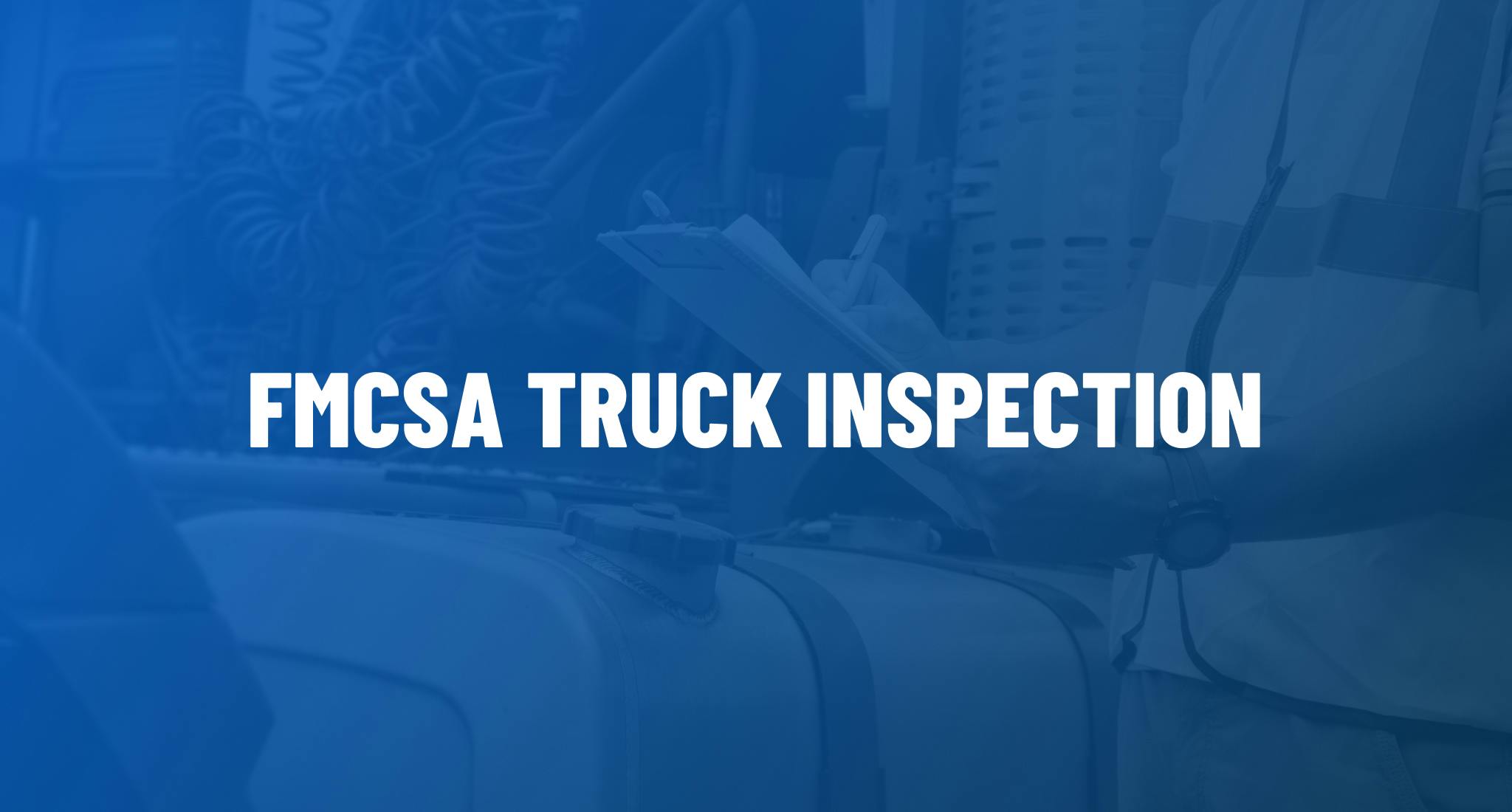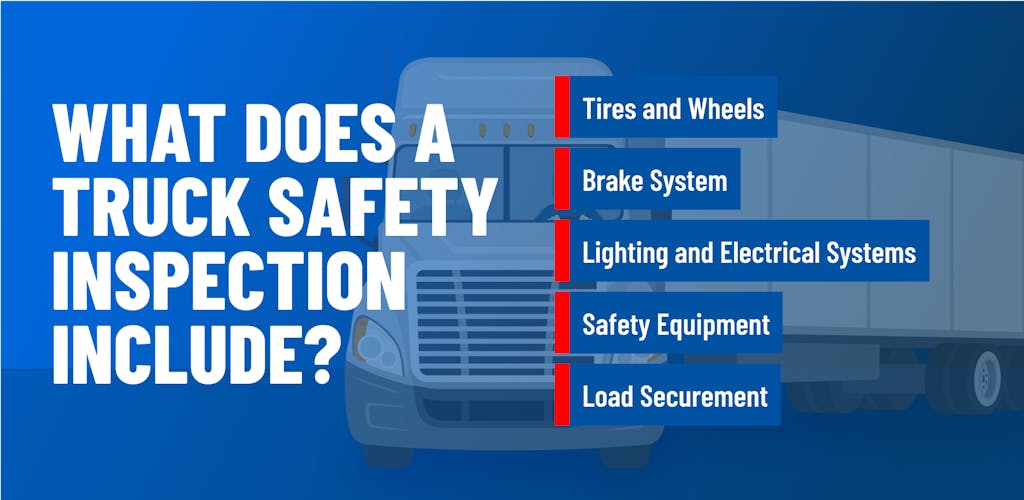FMCSA Truck Inspection
January 19th, 2024

FMCSA truck inspections are a cornerstone of road safety in the commercial trucking industry. Mandated by the Federal Motor Carrier Safety Administration, these inspections ensure that trucks meet stringent safety standards, safeguarding not just the drivers and their cargo, but also other road users.
They involve a thorough examination of the vehicle’s mechanical components, driver compliance, and cargo handling. Understanding and adhering to commercial truck inspections is crucial for trucking companies and independent operators, as it goes beyond regulatory compliance to foster a culture of safety and responsibility. This article will tell you everything you need to know for your next inspection.
What is an FMCSA Inspection?
An FMCSA inspection, conducted by the Federal Motor Carrier Safety Administration, is a systematic evaluation of commercial trucks and drivers to ensure they meet safety and regulatory standards. The primary purpose of FMCSA inspections is to enhance road safety by identifying and addressing potential issues or violations within the commercial trucking industry.
FMCSA inspections:
- Verify that commercial vehicles comply with federal safety regulations.
- Evaluate driver qualifications and adherence to safety protocols.
- Detect and rectify any safety deficiencies or violations.
- Promote overall road safety by ensuring that commercial trucks meet required standards.
- Enhance accountability and compliance within the commercial trucking industry.
Are FMCSA Inspections Required for All Commercial Trucking?
FMCSA inspections are not required for all commercial trucking operations but are specifically mandated for those engaged in interstate commerce and the transportation of hazardous materials. It’s important to understand which trucking operations fall under these requirements to ensure compliance and avoid potential consequences.
Interstate Commerce: Truck safety inspections apply to trucking operations involved in interstate commerce, which means transporting goods across state lines. If your commercial trucking activities involve crossing state boundaries, even occasionally, your operation is subject to FMCSA inspection requirements.
Hazardous Materials: Additionally, FMCSA inspections are essential for trucking operations that transport hazardous materials. The transportation of hazardous materials comes with heightened safety regulations and the need for careful adherence to FMCSA inspection protocols. This category includes a wide range of substances, from chemicals and flammable materials to radioactive materials.
Failure to comply with FMCSA inspection requirements can result in a range of consequences, including:
- Fines and Penalties: Violations of FMCSA inspection requirements can lead to fines and penalties imposed on both individual drivers and the trucking companies responsible for the vehicles.
- Suspension of Operating Authority: Serious or repeated violations can result in the suspension or revocation of a trucking company’s operating authority. This means the company may no longer be legally permitted to conduct business, which can have severe financial and operational repercussions.
- Safety Concerns: Non-compliance with safety standards and inspection requirements can jeopardize road safety. This can increase the risk of accidents, potentially causing harm to drivers, passengers, and the general public.
- Legal Liability: In the event of an accident, injury, or damage caused by non-compliance, trucking companies may face legal liabilities and lawsuits, leading to substantial financial and reputational consequences.
Given these potential consequences, it is imperative for commercial trucking operations involved in interstate commerce or transporting hazardous materials to diligently adhere to FMCSA inspection requirements. Compliance not only helps avoid penalties but also contributes to the safety and reliability of the entire trucking industry.
FMCSA Inspection Requirements: What Does a Truck Safety Inspection Include?

The Federal Motor Carrier Safety Administration (FMCSA) conducts comprehensive safety inspections on commercial trucks to ensure they meet stringent safety and regulatory standards. These inspections encompass various critical areas of the truck and its operation. Below, we will explore each area covered by the FMCSA inspections in separate sections:
1. Tires and Wheels Inspection:
During FMCSA inspections, the condition of a truck’s tires and wheels is thoroughly examined. This inspection includes checking tire tread depth, tire inflation levels, and the overall condition of tires and wheels to ensure they meet safety standards.
2. Brake System Inspection:
The brake system of a commercial truck is a vital component of road safety. FMCSA inspections involve a meticulous assessment of the brake system, including brake pads, drums, hydraulic systems, and air brakes, to ensure they are in proper working order.
3. Lighting and Electrical Systems Inspection:
The lighting and electrical systems of a truck are essential for visibility and safety on the road. FMCSA inspectors evaluate headlights, brake lights, turn signals, and other lighting components, as well as the electrical wiring, to verify their functionality.
4. Safety Equipment Inspection:
Commercial trucks must be equipped with various safety features, including fire extinguishers, reflective triangles, and first-aid kits. FMCSA inspections confirm the presence and condition of these safety essentials.
5. Load Securement Inspection:
Proper load securement is critical to prevent accidents caused by shifting cargo. FMCSA inspectors assess load securement practices, such as the use of tie-downs, straps, and cargo restraint systems, to ensure they comply with safety regulations.
Common Violations Found During FMCSA Inspections
FMCSA inspections often reveal common violations that can lead to penalties and safety concerns. Some of the most frequently encountered violations include:
- Brake System Issues: This includes worn brake pads, malfunctioning brake lights, and inadequate brake fluid levels.
- Tire Deficiencies: Violations may result from insufficient tire tread depth, underinflated tires, or damaged tires.
- Lighting and Electrical Problems: Common violations relate to non-functional headlights, brake lights, or turn signals, as well as damaged electrical wiring.
- Hours of Service (HOS) Violations: These involve drivers exceeding their allowed driving hours or failing to maintain accurate HOS records.
- Improper Load Securement: Violations can occur when cargo is inadequately secured, risking load shifts and accidents.
- Missing or Defective Safety Equipment: Violations may stem from the absence or poor condition of safety essentials like fire extinguishers or reflective triangles.
- Regular Maintenance: Maintain your truck and perform routine inspections to address any issues before they become violations.
- Documentation: Keep accurate records of maintenance, driver logs, and other required documents, making them readily accessible for inspectors.
- Driver Training: Ensure your drivers are knowledgeable about FMCSA regulations and inspection procedures to help avoid violations.
- Load Securement: Properly secure cargo and ensure it complies with load securement standards.
- Safety Equipment: Verify that all required safety equipment is present, in good condition, and easily accessible in the truck.
- Pre-Trip Inspections: Conduct thorough pre-trip inspections to identify and rectify any issues before hitting the road.
By following these steps, you can increase your chances of passing an FMCSA truck inspection with flying colors, maintain compliance, and contribute to road safety.
Frequently Asked Questions
What is the FMCSA safe spec?
The FMCSA safe spec, part of the Safety and Fitness Electronic Records (SAFER) System, provides safety data and compliance information about commercial motor carriers. It includes details like safety ratings, inspection summaries, and crash information, helping in assessing the safety performance of carriers.
What is the 3-year rule for FMCSA?
The 3-year rule for FMCSA mandates that motor carriers must retain records of accidents, inspections, and violations for a minimum of three years. This requirement ensures that carriers maintain a history of their safety performance and compliance with FMCSA regulations.
What are FMCSA violations?
FMCSA violations are breaches of the Federal Motor Carrier Safety Administration’s regulations. These can include a wide range of issues, such as exceeding hours-of-service limits, failing vehicle inspections, improper cargo securement, and lack of necessary driver qualifications or documentation. Violations can lead to penalties, and fines, and impact a carrier’s safety rating.
Learn More with Hale Trailer
With an extensive inventory of trailers and container chassis, Hale Trailer offers a wide range of options to meet your transportation needs. Whether you’re looking to upgrade your fleet, enhance safety, or explore innovative solutions, our dedicated team is ready to provide guidance and recommendations tailored to your specific requirements.
We invite you to browse our inventory online or visit one of our locations to experience the Hale Trailer difference firsthand. Partner with us to navigate the road to success in the commercial trucking industry.
All the information on this website – https://www.haletrailer.com – is published in good faith and for general information purposes only. Hale Trailer Brake and Wheel does not make any warranties about the completeness, reliability and accuracy of this information. Any action you take upon the information you find on this website, is strictly at your own risk. Hale Trailer Brake and Wheel will not be liable for any losses and/or damages in connection with the use of our website.
